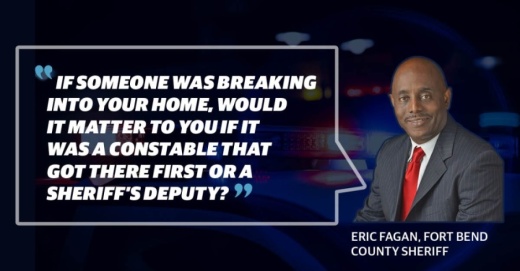For decades, Fort Bend County dispatchers answering 911 calls for an unincorporated area would send the closest law enforcement official—whether from the sheriff’s office or a constable’s office—to the scene.
On Jan. 1, 2019, however, former Sheriff Troy Nehls changed the policy, directing dispatchers to send only sheriff deputies to calls even if a constable unit was closer and under contract to patrol a specific area.
The policy—which stayed in effect until Fagan’s reversal—was the cause of several disagreements among county officials, led to a committee tasked with reviewing the change in practices and even prompted a discussion about stripping the then-sheriff of his authority over the emergency response system in unincorporated areas.
After his policy went into effect, Nehls said it was put in place because the sheriff’s office was considered the county’s primary public safety entity and contracted deputies were meant to be supplemental.
His explanation, however, did not alleviate concerns held by several members of the Fort Bend County Commissioners Court and the public, Precinct 3 Commissioner Andy Meyers said. The main concern, Meyers said, was residents in an emergency would be left waiting longer than necessary for help.
Two years later, Fagan said his reversal of the policy has been met with positive feedback. Put simply, the new sheriff said he wanted to revert back to the old practices because a quick response from law enforcement when an emergency occurs is a priority.
“If someone was breaking into your home, would it matter to you if it was a constable that got there first or a sheriff’s deputy?” he said. “You just want the quickest law enforcement agency there to get to you.”
Echoing Fagan, Precinct 4 Commissioner Ken DeMerchant said he was in favor of the policy reversal.
“It makes sense to be a team and to work together,” he said.
Changes in policy
Unincorporated areas, or regions not governed by a local municipal corporation, often contract additional law enforcement officers to increase the police presence, said Sgt. Matthew Hricko, a sheriff’s office supervisor in the Sienna master-planned community.
The sheriff’s office has deputies specifically assigned to neighborhoods through a contract program in which the homeowners association or municipal utilities district pays for the extra patrol. Currently, the county has 31 contracts.
In December 2018, the sheriff’s office sent an email to all county constable offices stating, “Beginning [Jan. 1, 2019,] calls for service in supplemental patrol areas covered by Fort Bend County constables will be dispatched to a [sheriff’s office] patrol deputy and not the contract constable,” according to past Community Impact Newspaper coverage.
Concerns Nehls’ new policy could delay emergency responses came to a head at a May 2019 Commissioners Court meeting, when Nehls said misinformation about the policy was being spread throughout the county. That misinformation, he said, included claims 911 calls were not being answered in a timely fashion.
Some agencies generally broadcast a disturbance, allowing any available unit to initiate a response to the call, said Meghan Rivas, the public communications manager of the county’s emergency operations and communications division.
Under Nehls’ policy, Rivas said, dispatchers were directed to dispatch county sheriff’s units instead of the contract constable units—even if the contract unit was nearby. Fagan’s reversal means dispatchers have gone back to directly dispatching contract units first, and if a county sheriff’s unit is closer and wants to respond or if additional units are needed, it is dispatched as well, Rivas said.
Looking ahead
Moving forward, Fagan said he aims to continue improving the dispatch process, starting by addressing a shortage in dispatchers. A study conducted before his tenure as sheriff found the county is 30 dispatchers short, he said.
Mark Flathouse, Fort Bend County’s emergency management coordinator, said dispatchers are considered first responders but are often overlooked.
“They are understaffed and underpaid,” he said. “We’ve got to protect them.”
DeMerchant, too, said there is always room for improvement. In February 2020, the commissioners heard a report conducted by public safety consulting firm Fitch & Associates, which indicated dispatch and arrival times were taking longer than they should.
The report listed several recommendations for the county to address. With a new sheriff in office, the commissioners can begin making progress on that list, DeMerchant said.
Meyers said he and other members of the court have proposed creating a centralized emergency dispatch operation to allow all area agencies in the county to join their efforts and form one regional system.
The centralized operation could help cut down on costs, he said, since the various agencies would contribute funding, and could help streamline care for residents in emergency situations. Meyers said he plans to pursue the idea more actively with the new administration.
Despite all of the dispatch practice changes, Flathouse said Fort Bend County officials share a common goal: getting the quickest, most reliable resource to an emergency as possible.
And I think that we’re working that way,” he said.
Laura Aebi contributed to this report. Read the print version of this story here.
Editor's note: This story has been updated to correctly reflect the number of contracts the Fort Bend County Sheriff's Office has with homeowners associations or municipal utilities districts. The print version of the story incorrectly stated the county has 35 such contracts.





